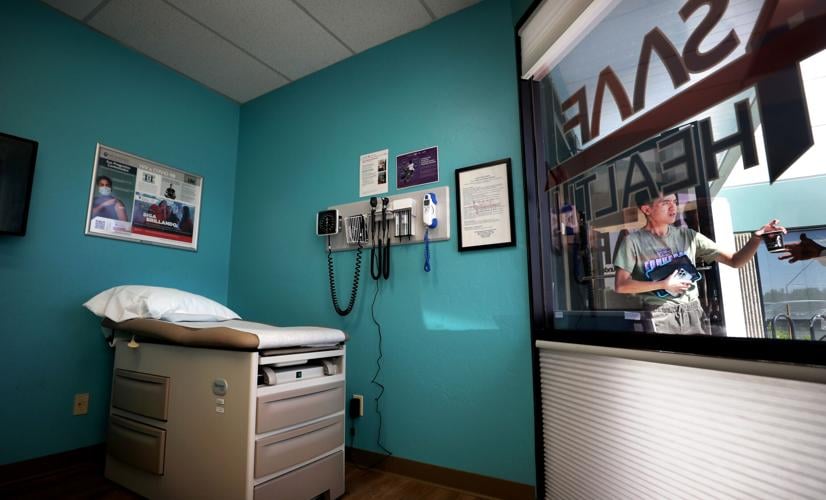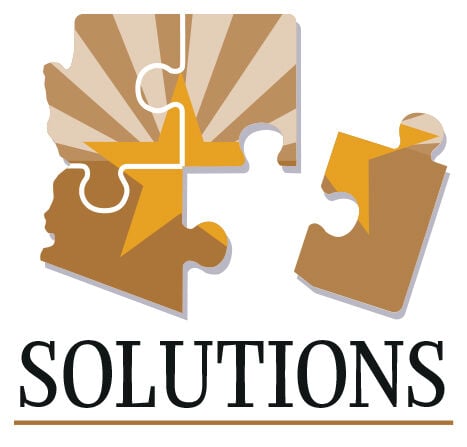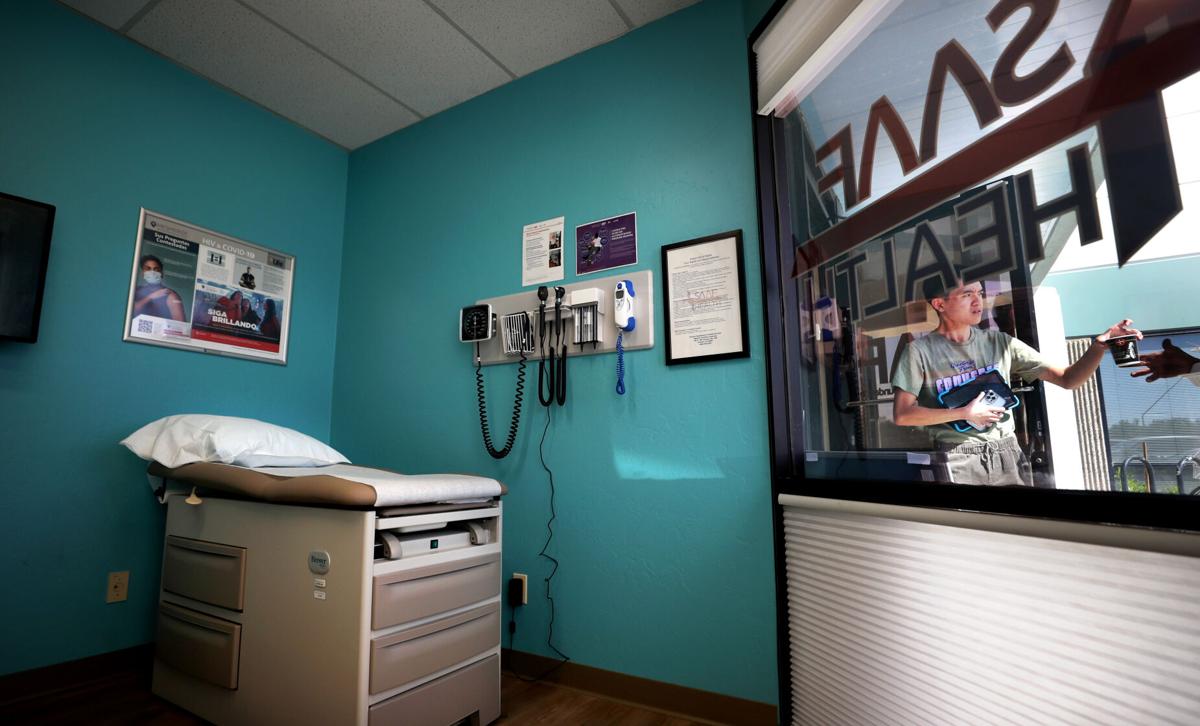A local nonprofit is getting ready to open the region’s first LGBTQ-affirming and dedicated health center.
For nearly 30 years, the Southern Arizona AIDS Foundation, which supports people living with HIV, LGBTQ+ individuals and marginalized communities, has provided testing for sexually transmitted infections and prevention and case management support.
Its leaders say the delivery of on-site, primary care services by providers trained in LGBTQ-affirming care is the next logical step. LGBTQ-affirming care means providing a positive and inclusive environment where people can find trust and open communication with their provider, they say.
SAAF Health launched via tele-health a little more than a year ago and already has 250 established patients who are receiving primary care services.
On Thursday, the clinic, on SAAF’s main campus at 375 S. Euclid Ave., passed state inspection and was officially approved to start seeing in-person patients.
An official launch and new patient appointments will begin in the fall.
Experts say the need for providers trained in LGBTQ-affirming care is great, as there are documented health disparities due to lack of care, and that providing equity in health care is especially important now that hundreds of legislative proposals introduced across the country in 2023 limit the rights of LGBTQ and transgender people.
The opening of SAAF Health is a step in the right direction, advocates say, as are unrelated, ongoing training efforts within the University of Arizona, El Rio Community Health Center, Banner-University Medical Center Tucson and Tucson Medical Center.
‘Always good to have a choice’
SAAF Health has done no advertising, so the 250 patients under its care found out about it on their own, said the organization’s CEO, Beth Frantz.
The goal is to increase access to care and improve health outcomes for the LGBTQ+ community and other marginalized populations, such as people experiencing homelessness, refugees, people without legal immigration status, people of color, and people who inject drugs, including more than 300 weekly participants in SAAF’s Syringe Access Program.
“It’s always good to have a choice in health care, wherever you live. and there are some really good choices at some of the hospitals and other federally qualifying health centers,” Frantz said. “But what we’re going to be able to offer to our community is primary care and behavioral health in a way that’s gender-affirming and LGBTQ-affirming. I’m really happy to offer this community this other choice.”
The World Health Organization defines gender-affirming care as a range of social, psychological, behavioral, and medical interventions designed to support a person’s gender identity when it conflicts with the gender they were assigned at birth.
A 2021 study conducted by the Kaiser Family Foundation found that while LGBTQ+ people are as likely to have a regular provider and usual place of care, they were more likely to report a range of negative experiences, including being blamed by their provider for health problems or having their concerns dismissed. The foundation is a nonpartisan, independent source for health policy research, polling and journalism.
Lydia Kennedy, executive director at the University of Arizona-Health Sciences Office of Equity, Diversity, and Inclusion, said the need for such care has been the focus of her work the past eight years.
Kennedy said El Rio Community Health Center led the pack in terms of establishing LGBTQ-affirming care in Tucson, but other organizations have since follow suited. At the request of supervisors in 2018, she developed LGBTQIA training that was delivered to 1,500 Banner-University Health Center Tucson employees. She’s now working with TMC to develop similar training.
She also started an interest group within UA Health Sciences and revised the training used in several UA colleges, including nursing, pharmacy and public health.
In the years since Kennedy’s initial training at Banner, the hospital has enacted systemwide changes, including all-gender bathrooms, printed pronouns on staff members’ badges, a review of patient charts to ensure the use of inclusive language, signage to indicate the facility is a safe space for people of all genders and orientations, and more.
Increasing LGBTQ and gender-affirming care in the community and creating more spaces like SAAF Health is especially important in the current political climate, Kennedy said, as a litany of anti-transgender and LGBTQ legislation is introduced across the country.
“The need for this is more than ever,” Kennedy said. “Unfortunately, the ramifications of not getting the proper health care is huge. My goal is to prepare a richly diverse health science workforce that can address the needs of the community and establish equity and inclusion for all.”
Recent studies show that LGBTQ-identifying patients report providers have used excessive precautions, refused to touch them, blamed them for their health status and in some cases, even denied medical care, Kennedy said.
SAAF’s director of development, Monique Vallery, said LGBTQ people face higher rates of cancer and other diseases, in part because they’re less likely to seek medical care.
LGBTQ+ people more commonly reported being in fair or poor health than non-LGBTQ+ individuals, despite being a younger population, according to the Kaiser study, which also found that LGBTQ+ people reported higher rates of ongoing health conditions and disability or chronic disease.
“It’s often a very traumatic experience to find a primary care provider who is there to truly uphold the oath of service and not be judgmental,” Vallery said. “The biggest driver here is, how do we take away the barriers? How do we create a safe space where patients feel comfortable and where they’ll be seen and not just pushed through really quickly, but rather address the needs they have and then get them the services they need?”
Vallery said SAAF Health’s 250 patients so far show there’s a need for this type of primary care in the community and she’s excited to see what happens when the clinic opens its doors and starts advertising.
SAAF Health accepts most insurance and if a person is insured, they won’t be charged a copay. Cost will depend on treatment, Vallery said, but if a person doesn’t have insurance, they’ll still be seen.
“We want our community to be healthy. That looks very different for every person,” Vallery said. “At the end of the day, it’s about supporting every patient that we encounter. And we’re ready for it.”

Primary care for ages 13 and up
Jamie Dromgoole-Hernandez, SAAF’s director of clinical and prevention services, spent the past 18 months meeting with other agencies, attending conferences and talking with providers as she prepared for the opening of SAAF Health’s physical location.
A registered nurse for 20 years, Dromgoole-Hernandez said she’s excited to help SAAF transition into the medical realm, calling the process a labor of love.
The two-room clinic will be staffed by one full-time and one part-time nurse practitioner, a medical assistant and Dromgoole-Hernandez, but SAAF is open to expansion as needed.
“It doesn’t matter where you are in your life, we can help you,” Dromgoole-Hernandez, said, adding that SAAF Health provides primary care services to patients ages 13 and up, including physical exams, pap smears and any other type of service a person could receive through a primary care provider.
They’ll be able to administer vaccines, and thanks to community partners, will have medical equipment, such as blood glucose or blood pressure monitors, to give or loan to patients in need.
Patients who need HIV care will still be sent to an outside clinic, but if a patient tests negative, SAAF’s prevention team is on-hand to get the person started on prophylactic treatment.
“Keeping people free from HIV and finding those that have it and getting them on care as soon as possible is something SAAF has always done well and we continue to do that,” Dromgoole-Hernandez said. “Now, we have that extra level where can meet people where they are and really make a difference in their lives.”
One SAAF Health patient said the process of signing up and receiving care was “super easy,” as simple as filling out a form on the website, after which she immediately received a phone call.
“Normally to establish care I would sometimes have to wait two months to see a physician,” said the patient, who asked that her name not be used. “This one was right away, I was very happy with that.”
She said her provider, family nurse practitioner Melissa Lyapustina, made her feel comfortable right away, asking about her pronouns and her partner’s orientation and pronouns.
“Melissa has been so good and so knowledgeable. She gives me tips on even the smallest things,” the patient said. “I’ll tell her I was trying to change my sleep schedule and she’ll give me little advice on what to do and how to do it. Like with melatonin, the smaller amount you take, the more it works.”
A cisgender woman of color, the patient said it was important to her to find a doctor who will treat her fairly and give her the respect she deserves.
“I felt like a lot of physicians can be dismissive, and that doesn’t really help me,” she said. “Not only does it not help me physically, but it does something to you mentally. When you fell dismissed, you wonder why.”
She said she needed to find a provider that made her feel seen, and she’s found that through SAAF Health.
“Melissa is very supportive,” the patient said. “I just feel like she asks all the right questions to get to know me. I’m very, very happy with my choice.”
Well-rounded services
SAAF Health patients will also have access to other services they may need with the help of a trained navigator.
“Let’s say they need to go to a specialist which we don’t have. They’ll be connected to a case management navigator who will help set up appointment and can go with them,” CEO Frantz said. “They’ll be hands-on for the first three months or so, then transition the patient to a permanent case manager who will be with them as long as they need.”
These wraparound services don’t just include specialists, but also housing assistance, life skills or other needs.
“We’re hoping to be able to provide well-rounded services to our patients,” Frantz said. “Being able to navigate their concerns appropriately in a way that’s respectful to the patient while also getting their health-care needs met in the best possible way is critical.”
The next phase of SAAF Health will be an on-site community pharmacy, said Vallery. It will be open to patients as well as community members who may wish to have their prescriptions filled at SAAF.
“The idea is that when someone walks in the door, we can provide them with as many wraparound services to hopefully send them out to protect themselves and protect the community,” Vallery said.
UA Health Sciences’ Kennedy said in order to ensure the best possible outcome for patients, everyone on their care team — from receptionist to specialist — has to have the training and knowledge to make that happen.
“My slogan I say in every training is, ‘What business are you in? You’re in the business of healing, not hurting. If you treat patients (with bias) that’s hurting them,’” Kennedy said. “You don’t know how many adversities or health care rejections they’ve already gone through by the time they get to your door. You might be the person who brightens their day or you might be the last straw (to where they stop seeking care.)”
“It’s always scary going to the doctor. I don’t think a lot of people like it,” said SAAF’s Vallery. “But being able to go somewhere and know that you’re going to be able to be seen or heard, that’s crucial. And for folks in marginalized communities, it’s really a big deal.”
Get your morning recap of today's local news and read the full stories here: http://tucne.ws/morning






